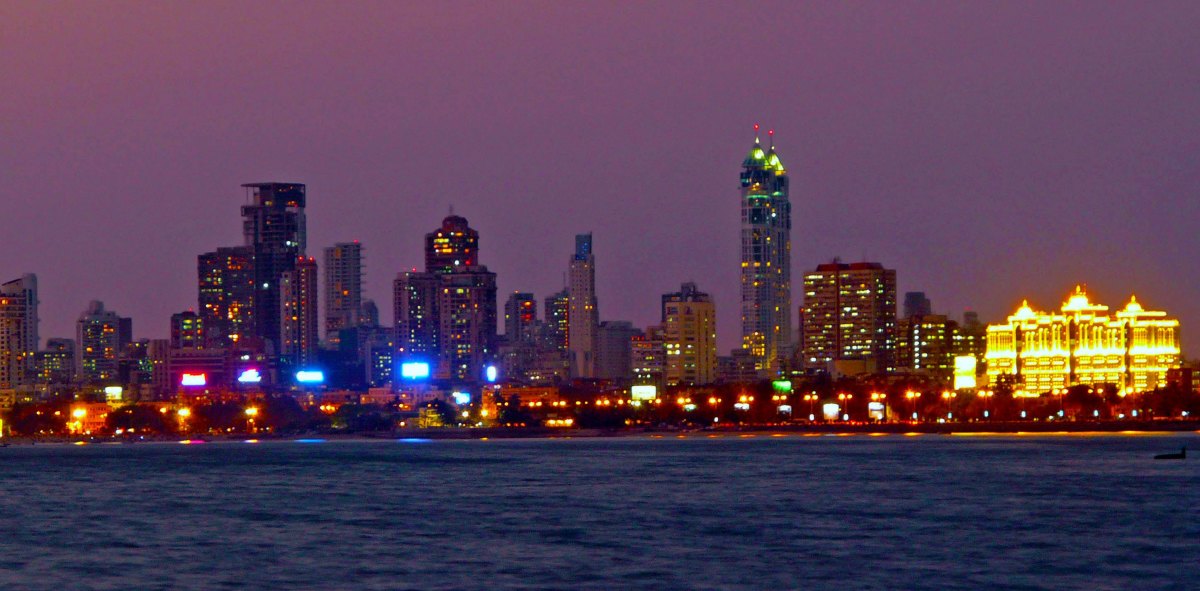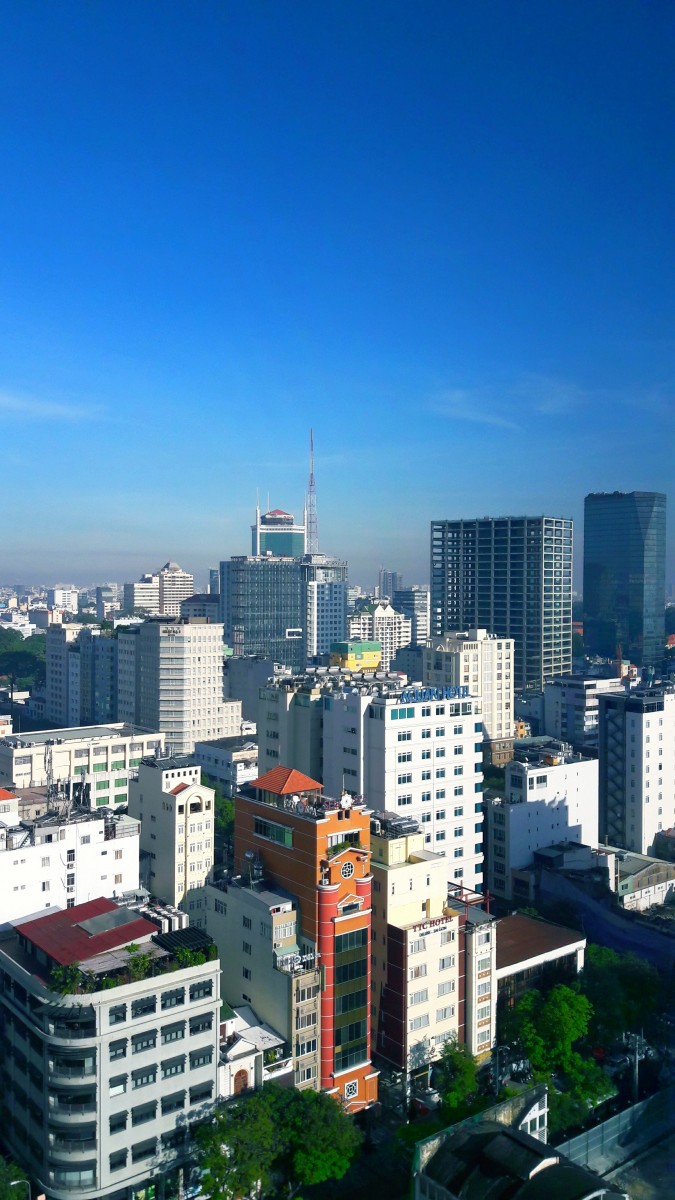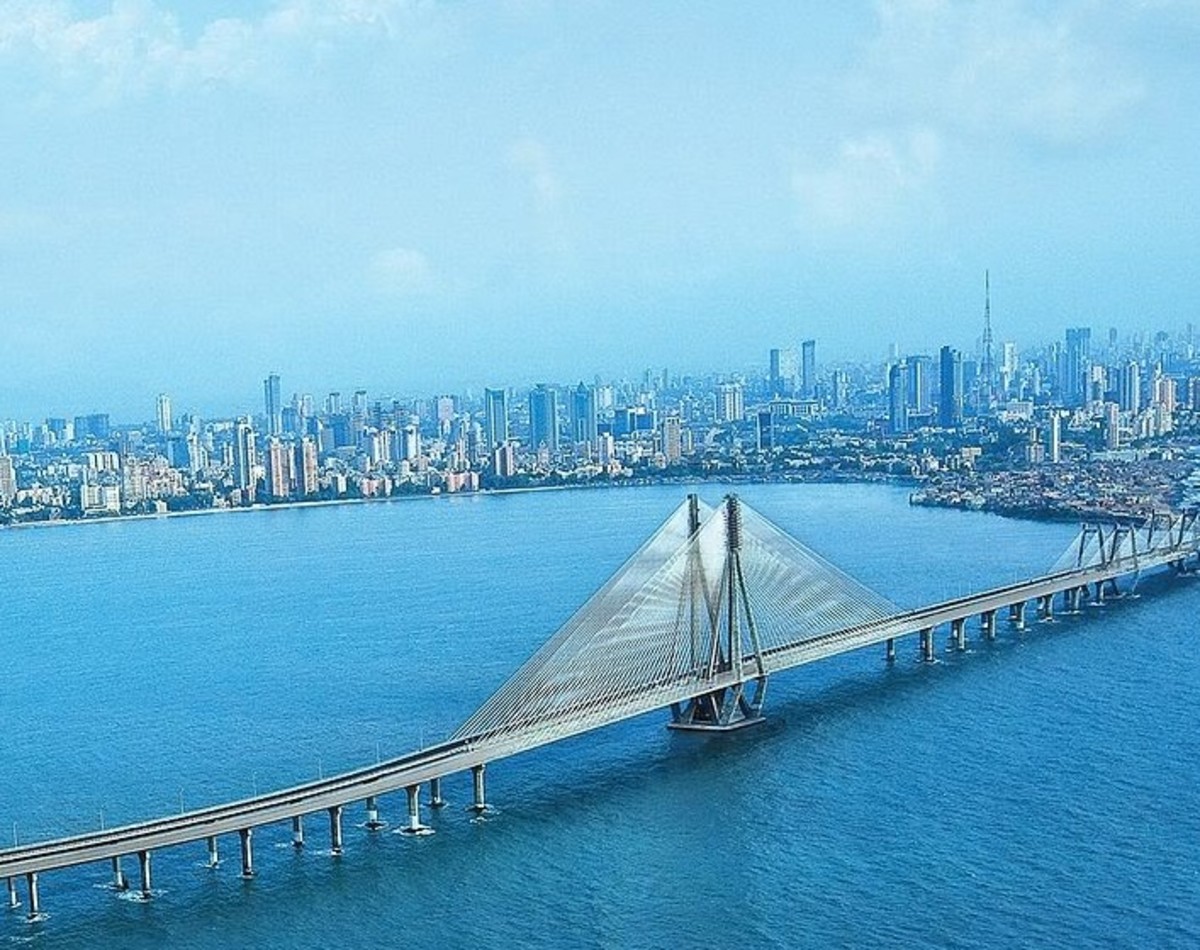Mumbai: City of Dreams and Nightmares
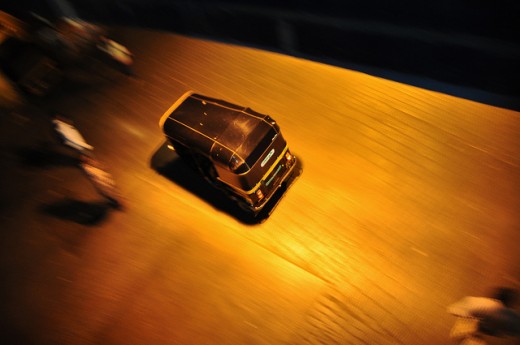
"Inconvenience caused is regretted" says a maintenance sign in Mumbai airport. I ponder this wisdom. It seems even the builders are gurus in India; I've come to the right place.
I'd travelled from a highly ordered society – creeping toward the totalitarian – to its antithesis. It was part of what I was looking for, so I thought. Before heading through passport control at London Heathrow I had audaciously asked an officious middle-aged airport automatrix (a cross between an automaton and a dominatrix - my invention) why I was forbidden to take more than 100ml of water through with me. "Because it's the rules." Her exact words. Her ire already beginning its rise because I had the gall to be curious about an apparently capricious new ruling. God help us all if Al Qaeda ever unsportingly teams up two of its operatives to combine their deadly fluids.
I wander out of the Mumbai arrivals hall into the clammy late evening and a clutch of touts and taxis that looks like market day in a busy town. I've pre-paid for a taxi at a desk in the arrivals hall to take me to my hotel fifty minutes away in the city. A tout unnecessarily, and unsolicited, helps me find it ten metres away and then holds out his hand. I ask if he will take my unwanted British coins and he agrees. I give him my remaining 70p of change. "No paper?" he asks sneeringly. I give him a further two rupee coin, which is, apparently, the equivalent of dropping pocket fluff in his palm.
A fittingly exotic non-English speaking old Sikh seats himself at the wheel for my exciting first taxi ride in India. We set off into the night, warm air billowing through the window with a tinge of Mumbai dust that tells me I’m somewhere very different now. In the next hour I see a year’s worth of bad driving, and a year’s worth of life. It’s around midnight and I see groups of people, mostly men, walking the unappealing dark and dusty streets, lots of guys with arms in brotherly fashion over shoulders. I see crowds of pavement sleepers, men, women and children. I see one crouching huddle of about fifteen, arms aloft, begging for something from a figure that stands beside them, as if he were the star of a show in a musical for which they were only support players. Mounds of rubble has similarly been collected and dumped against the sides of many buildings. The city looks like an abandoned construction site, or the New York of the film Escape from New York, fenced off as one giant prison and abandoned to the damned.
But I enjoy the ride and the sights, and it only crosses my mind a couple of times that I could be driven down some back street and never heard of again. If so, I think, let’s just hope it’s a car smash and not something more sinister. Nobody has bothered to paint any road markings that I can see, and traffic lights are merely a suggestion: you might want to stop, you might want to go. Each intersection reminds me of a precision aerial display with vehicles swerving in every direction and narrowly missing as if to make the crowd go “Oooh!” A few days later I read in the Hindustan Times that the city’s roads kill at least three people every two days. In Mumbai, there are 591 vehicles per square kilometre, almost double the international standard.
"Crowded Trains Bring People Together"
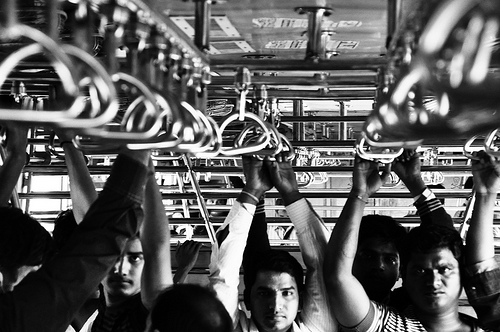
I notice a roadside billboard which brightly proclaims: “Crowded trains bring people together”. Though it looks Orwellian, it’s seemingly a quote from a caller to Mumbai Talking, a local radio show or radio station. That's what we're supposed to think, anyway. I see a letter in the Hindustan Times a few days later from another similarly upbeat citizen who boasts outlandishly: “I travel to work in the morning and it’s fun. I have a new experience every day.” He goes on to contend that those who complain about the conditions in the city are newcomers to Swapna Nagari, the City of Dreams, full of pie-in-the-sky expectations. He goes on: “Yes, it is a crowded city, the roads are not good and there are slums everywhere. … Nobody likes to see people defecating along the roadside or get caught in endless traffic. But these problems are the result of the city’s warm and welcoming nature.” So, now we’ve welcomed you in, don’t complain it’s hell. It’s a warm and welcoming hell. It’s definitely warm, anyway.
In the same issue of the Hindustan Times is a story about one man who wasn’t kept sane by zippy proclamations. After his room in a slum was “redeveloped”, Aazam Hasrat Sayeed discovered the new room he had been promised had been allotted to someone else. Over a period of four years, Sayeed was constantly turned away by the Slum Rehabilitation Authority (SRA). After waiting yet another hour and being stood up by the Deputy Director of the SRA, Sayeed slashed his arms, legs and neck with a blade in protest outside the Deputy Director’s office. Fortunately - though perhaps not for the unemployed and homeless Sayeed - he survived. The Deputy Commissioner of Police for the area commented that Sayeed “was obviously frustrated. But if his suicide attempt was just a stunt, we will take action against him.”
We arrive at my hotel which lurks down a dark foreboding backstreet near the Chhatrapati Shivaji Terminus (CST), Mumbai’s main train station. My room is basic and ugly, but I’m excited to be on the cusp of months of travel. I shower and wash my T-shirt with a bar of soap, enjoying this first little ritual of shoestring independent travel, and leave it to dry overnight as I know it will. Through the louvered bathroom window I notice a man stretched out on the pavement outside, just beside a large rubbish bin. I feel very lucky - unfairly privileged, in fact - in my basic and ugly room.
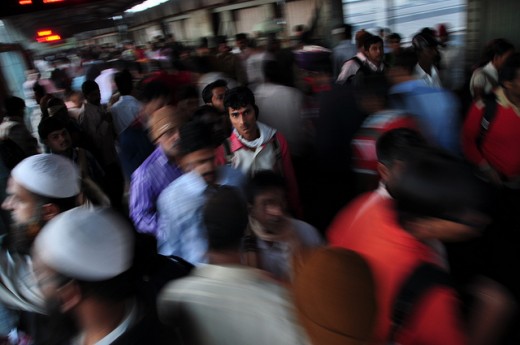
I was tired from travel and spent most of my first day in Mumbai resting in my hotel room. I gathered up enough energy and resolve by 4.30 to head out onto the blazingly hot streets for the part of the city where tourists tend to congregate, eat, and mill about. I hadn't milled about all day and it was getting to that time.
I descended to the street and hit a purposeful stride, as if I were a local – a pale, shorts-and-T-shirted local. I headed south towards the Colaba district, feeling vulnerable and in no mood to be accosted by beggars, hawkers, the curious or the scornful. Looking straight ahead, with a thousand-yard-stare, I walked as rapidly as any of the office workers who bustled alongside in their attempts to shave precious minutes from their average two-hour plus commute. According to the city’s police, Mumbai’s commute is the world’s most deadly, with “rush hour”, by some estimates, lasting a frantic and gruelling eight hours a day.
I’m just getting hotter, rather than nearer my destination, and so jump in a cab. The driver doesn’t know where the hell I’m talking about when I tell him I want to go to the city’s most famous monument, the Gateway of India, a grand and imposing 26-metre high basalt arch that dominates the waterfront – he must have noticed it before, I think. I know there’s a famous luxury hotel directly opposite called the Taj Mahal, a familiar and foolproof name in India, and tell him to head there instead.
We reach the hotel and before I can tell him otherwise the driver has swung our decrepit yellow and black standard issue Mumbai taxi across the expansive forecourt to halt by an entrance that’s been blessed by the likes of Mick Jagger, Prince Charles, The Beatles, Bill Clinton and Jackie O. Famous, rich and successful people, in other words. A great monument of a man, a huge, mustachioed Sikh, dressed in what appears to be ceremonial military attire, sweeps up to the cab and opens the door for me.
The Hotel that Tata Built
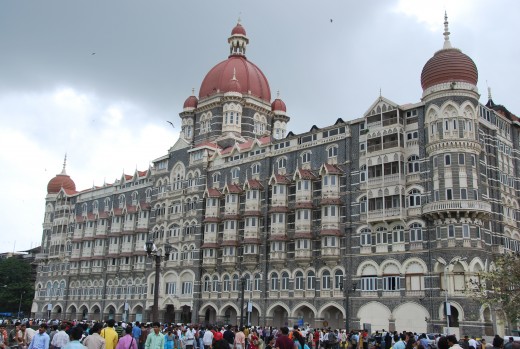
Instantly I feel shamed that he has to touch this dusty, rattling tin machine. “I’m sorry, there’s been a misunderstanding,” I explain, which is quite clear to the doorman even before I open my mouth. He’s clearly disgusted and doesn’t waste even a word on me. I sidle away across the ocean of the forecourt, back to the anonymity of the thronging multitude outside.
The Taj Mahal Palace hotel was completed in 1903 by Jamsetji Tata, an industrialist who, legend has it, built it after being refused entry to a British-run hotel nearby. Ironically, I had felt distinctly out of place traipsing across its vast forecourt, the feeling exacerbated by an irresistible heightened self-consciousness at being an exhausted white-skinned alien in the city. I didn’t belong: me, a Brit, in my country’s own former colony! It’s enough to make you want to build a hotel.
Instead, I walked around the Gateway of India which, with its circling throng, reminded me of a minature version of the ritual circumambulation of the Kaaba at Mecca. As I walked around it, the eyes and attentions and hawkings of hawkers clawed at me the whole way. It was imperative they discover if I need to buy any photographs, postcards, sunglasses, and so forth. This isn’t pleasant, I thought, and struck off around Colaba in search of something more homely and western where I could take a breath.I noticed few westerners and few reasons why they might gravitate to this district, other than the rich citadel that is the Taj Mahal hotel and its attached designer label boutiques. I envisioned daily pitched battles, guards riding shotgun and firing into the rampaging mob as Louis Vuitton and Fendi trucks ploughed through the human barricade.
I "did some internet" in a sweltering cyber-cupboard on a dirty and stinking street, of which there are several to choose from in Colaba, before deciding to cut my losses and return to my room. By this time I felt like a diver running low on oxygen; time to surface. I walked a while and picked up a couple of beggars in my tow before I decided to jump in a taxi. One of the beggars, a forlorn man in his thirties, came to the window to implore me for a hand-out as we waited at a junction. He pointed to the stump at his shoulder where an arm should be.
But I had shut down hours ago and was shaking my head and coldly repeating “No”. I looked in his eyes to at least give him the feeling that I saw him, that I was present with him. He was right there, too. But I’d made a general decision not to give to beggars, and so I don’t feel shamed; I can’t give to them all. Later, though, back in my room, the deeper reality of this scene dawns upon me, and I see that whichever way I might like to rationalise it, earlier that evening I had been sitting in a taxi while a one-armed homeless man, begged me for some change, and I had emotionlessly looked him in the eye and said no. I thought about the huge underclass in Mumbai, the slum dwellers and pavement sleepers, the street hawkers and beggars, all of them daily and desperately chasing these tokens called money. In life, some of us have them, all of us want them, and a few of us need them. Already, after seeing these few glimpses of the poverty and facts of existence in India, I felt I would never be the same.
Once more, the taxi driver didn’t understand where I wanted to go, so I told him the CST, the Chhatrapati Shivaji Terminus, the city’s main railway station, which was near to my hotel, though exactly where in relation, I didn’t know. I jumped out of the taxi close to the station on the darkening streets. Mumbai has a serious power shortage which I guess explains the dimly lit but still bustling city streets. Then again, perhaps the light is actually being sucked into the CST, a brooding Venetian Gothic building that feels to me like a black hole, sucking in all the human life in the locale, all the street people, the vendors, rail passengers, taxis, autorickshaws. I head towards it to check the details of my morning departure to Pune, or at least that’s why I think I’m heading inside. The density of people gets greater and greater the closer I get to the building until they’re lying strewn across the main hall inside, either waiting for a train or bedded down for the night. Somewhere in the hall I feel is a point where humans have reached a singularity point of infinite density. I step over bodies, get my information, and head out before I’m sucked in forever.
The CST Train Station
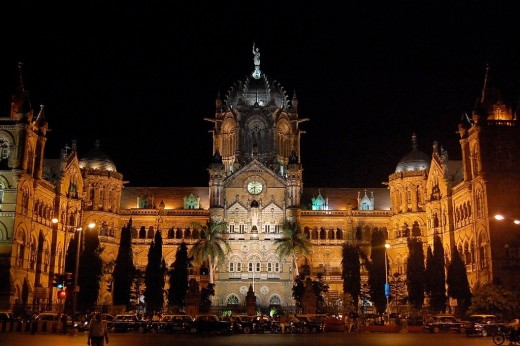
As I pull myself away from the CST and its whirlpool of life, I reflect that writing about India is like shooting fish in a barrel. Everything is remark-able, and as a consequence I feel less inclined to remark. I am so different to this place that I feel the incongruency in everything. Every possible tale is just a construction, a selective fiction; it seems I should record all of it (impossible) or none. I’m too overawed to refine the essence. I feel I’ve been transferred from a placid freshwater lake to a turbulent salty ocean full of all manner of creature, some abominable.
I’m dizzy and covered in all the filth that descends upon you and oozes out of you while walking Mumbai for five hours. The map I have is not detailed enough to deliver me to my hotel and taxi drivers certainly don’t know where it is. I go into an unfriendly internet place to consult Google Maps and have to present my passport before they let me use a machine. I knew that India was fast becoming a major player in IT, boasting some of its finest minds, but I didn’t think I could yet download myself to another country. It turns out I can’t and the only thing I can do is direct a taxi back to my hotel and crawl into bed. It’s been a disheartening day. But I at least had my escape planned for the following morning when I would depart the city for Pune, surely a more peaceful place; it’s the setting for the Osho Ashram, afterall, to which I was heading for a dose of refined spirituality.
I’d paid a porter in my hotel to buy a train ticket for Pune, not yet daring to personally dive into the bureaucratic nightmare and physical hurly-burly of purchasing rail travel in India. I settled into the air conditioned semi-comfort of the carriage and examined the poorly hung and poorly photographed A4 pictures of steam engines at the front of the carriage which helped remind us all of what we were engaged in. I was feeling good, excited to be leaving Mumbai, expecting to watch from the window as its chaos, dirt and poverty receded, surely to be replaced by an exotic and beautiful natural landscape. Instead, slums merely segued to ramshackle rural dwellings on small patches of land that looked far from fecund, much of it covered in litter and assorted human detritus. Plastic bottle collectors carried huge bulging bags of their negligible bounty by a trackside adorned all the way by squatting morning shitters. It’s incessant, ugly grinding poverty all the way. Too many people in too small a space dividing up too little of nothing.
The carriage is full people who must surely be in the top few percent of wealthy Indians, with their mobile phones, expensive watches, smart clothes, and laptops. None seem in the slightest bit interested in me, though I feel I’m sticking out like a sore thumb. The carriage is so grim, so un-ergonomic compared with western trains. And just outside our little air-con bubble and limited luxury, is sweltering stagnant India. Something inside was screaming repeatedly: “What are you doing here?”
When the chai man came through the carriage I grabbed a cup and ate some of my high-cocoa chocolate to drug myself. My mind focuses, taking me away from tortured mental wranglings about poverty, inequality and all the curses of the material world. With relief the chocolaty molecules soon insulate me, halting my mind from its splintering, staunching my bleeding heart. I’m just acclimatizing, I tell myself, I’ll get into the swing of things.
We all stream in a big crush from the train and Pune appears to be as hot and mad as Mumbai, just on a smaller scale. The 560 metre elevation doesn’t seem to hold the mercury down much, and having eight million people less than Mumbai doesn’t yet make for a quiet Swiss village type atmosphere. It wouldn’t be so bad if it wasn’t the hottest time of the year and I wasn’t dragging myself around with a mystery illness. I quickly check into a hotel where the staff are so nice that I feel they consider me close to human, perhaps something akin to an abominable yet pitiable chimera, the result of some diabolical cloning experiment that had nevertheless used a handful of recognisable strands from the genome. I go for a much needed shower and a lie down. My engineers didn't intend me for this.
To be continued ...

